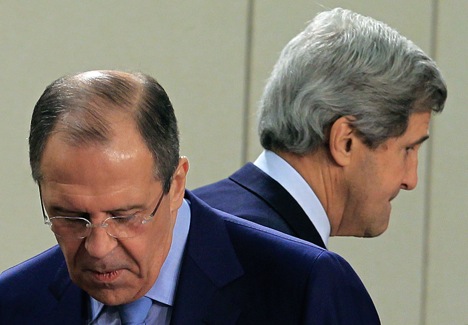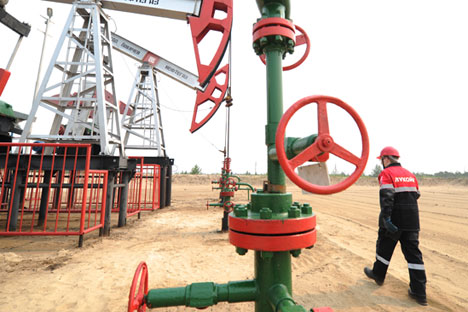Why sanctions are stupid and spell the end of western influence

Perhaps the hawks in Washington are now dusting up Plan B. Source: Reuters
Economic sanctions on Russia seem to be hurting the imposer more than the intended target. Britain’s oldest conservative think tank, the Bow Group, has published a paper from six Eastern European analysts on the affect of sanctions against Russia on Eastern Europe and the wider West. The report reveals the estimated financial costs of sanctions to the West could exceed $755 billion – roughly equal to the annual US defence budget.
The paper details the potential costs: the UK will lose $9.6 billion in exports, 119,000 jobs and $41 billion of Russian capital invested in the country. The US economy is expected to take a hit of $137 billion in trade, including $38 billion in exports, and up to $30 billion in US capital tied up in Russia.
To illustrate why and how this is happening, let’s start with what’s happening in a key sector – oil.
In September 2014, Russian oil giant Rosneft and US oilco ExxonMobil announced the discovery of a huge new oil deposit in the Kara Sea northeast of Murmansk. The Arctic well – with a drilling area the size of Moscow – contains around nine billion barrels of crude oil. At today’s prices it would be worth $43 trillion – or 43 times the annual income of Australia.
Exxon executives had barely raised a toast to one of the most spectacular discoveries in their long history when the hangover happened. The US ban on ties with Russia forced the company to call off its partnership with Rosneft.
Strategic risk consultant and author William Engdahl explains the significance of the American company’s loss. For more than two decades Russian oil companies had dreamed of tapping this gusher. It took the combined resources of Exxon and Rosneft to finally drill in the Arctic, with the first well – the most expensive in ExxonMobil history – costing $600 million.
And here’s the cruellest part. According to Engdahl, “Conveniently for Rosneft, ExxonMobil is forced out just after finishing the most complex and difficult part of the project.”
According to him, until the Ukraine crisis and sanctions, Russia had jealously limited foreign share-holding in its state-owned oil and gas companies. That’s now changing with deepening energy ties between China and Russia, ironically, the opposite result of what America’s Eurasia strategy is intended to achieve.
According to Stephen Kinzer of Brown University, “By pushing Russia away, we are driving it toward China, thereby encouraging a partnership that could develop into a true threat to American power.”
If the Russia-China partnership morphs into a military alliance, all bets are off America.
Pain at the pump
Other measures aimed at hurting Russia are boomeranging. When the US – in cahoots with its Saudi sidekick – started driving down the price of oil, the Americans scarcely knew they’d be the ones falling in their own trap. With the price of oil sloshing around the sub $50 mark, the US finds its own oil sector reeling.
Low oil prices are leading to investment cutbacks across America. UPI reports that “$1.5 trillion of investment spend destined for new and US tight oil projects is now out of the money”, with 40 major projects on hold.
Falling investment is having a cascading impact on production. “There are signs that US production has started to respond to reduced investment activity,” the Organization of Petroleum Exporting Countries says in its monthly market report. “All eyes are on how quickly US production falls.”
America can say goodbye to its plans to be an oil exporter.
Financial harakiri
Finance is the bedrock of the western economic system. It is a measure of the world’s confidence in the stability of this system that its two primary nerve centres are in New York and London. The latest sanctions are eroding confidence in this financial ecosystem and driving finance to places like Shanghai. This won’t take long because unlike investments in automobile plants or engineering enterprises, financial flows are easy to reroute.
When the US imposed sanctions on Russia’s SMP Bank in March 2014, the hawks behind the move thought the 170,000 Russians losing access to their Visa and MasterCard accounts would turn against the Russian government. But ordinary Russians are not easily fooled and clearly know who approved and implemented the sanctions.
Guess who the real loser is. “In the longer term, damage to the initiator can be much greater, and in this case erodes US credit card dominance,” Scott Semet, an expert on Russian financial markets, writes in a detailed analysis on sanctions in the National Interest.
And the unexpected winner: China’s UnionPay, which was already set to be a major challenger to Visa and MasterCard due to its dominance in settlement and payment services in the world’s largest market. “Western readiness to sanction credit cards no doubt served as a wakeup call to China and others, and will lead them to redouble their efforts,” Semet explains.
It is clear that denying access to western capital markets undermines their attractiveness to borrowers from other regions. Countries such as India and Iran, which have been hit by western sanctions in the past, are likely to be wary of fickle western capital. “Imposition of these sanctions was a wake-up call that borrowers can be shut off markets if they refuse to toe the line,” says Semet. “The damage is amplified as currently the world is awash in capital, and profitable opportunities to employ it are limited. Such opportunities are more likely to be found in developing countries, not stagnating western ones.”
That is exactly right. Russian companies are now seeking finance from China, which has foreign currency reserves of $3.3 trillion. Plus, private Russian companies can borrow from the BRICS New Development Bank and the China-led AIDB.
The really curious part is that western nations are showing such alacrity in hurting Russia at a time when the BRICS – Brazil, Russia, India, China, South Africa – group is erecting alternate systems that are independent of western control. Russia which is at the core of virtually every group – including BRICS, SCO and the Eurasian Customs Union – aiming to realign the world away from the West, would be thrilled that its efforts are gaining traction.
Russia’s resilience
To be sure, sanctions will take their toll on Russia too. According to Citicorp, every $10 decline in the price of crude shaves 2 per cent from the country’s GDP.
But here’s what Russia is doing – while it may appear counterintuitive, Moscow is pumping even more oil into the global markets than before. This is aimed at protecting its market share. For, if the Russians cut back, the suicidal Saudis will make a grab for it.
And it seems the strategy is paying off. Citicorp says Russia’s GDP could grow – by western standards, a healthy – 3.5 per cent per year. And this is without expecting a recovery in crude prices.
Counter sanctions – imposed by Moscow – are forcing Russians to find alternatives for a variety of products such as French cheese and Italian olive oil. Plus, the fall in the ruble has driven up the prices of many imported items, leading to companies buying cheaper Russian products. Both factors have caused a spurt in national economic activity which any economist will tell you is a good thing.
The benefits of forced import substitution would not be lost on other countries that are watching with interest the West’s economic warfare on Russia. For, they too can replace western goods and services and boost their own economies, avoiding the classic “drain of wealth” syndrome.
Stop digging in your hole
When sanctions begin to hurt the imposer more than the target, it is a sign that the imposer should either withdraw the existing sanctions or at least stop imposing new ones. In layman’s language, when you are in a deep hole, it’s best to stop digging. But clearly the Americans and their sidekicks in the West are way over their heads in events they can’t begin to understand, let alone control.
Perhaps the hawks in Washington are now dusting up Plan B.
The opinion of the writer does not necessarily reflect the position of RIR.
All rights reserved by Rossiyskaya Gazeta.
Subscribe
to our newsletter!
Get the week's best stories straight to your inbox
